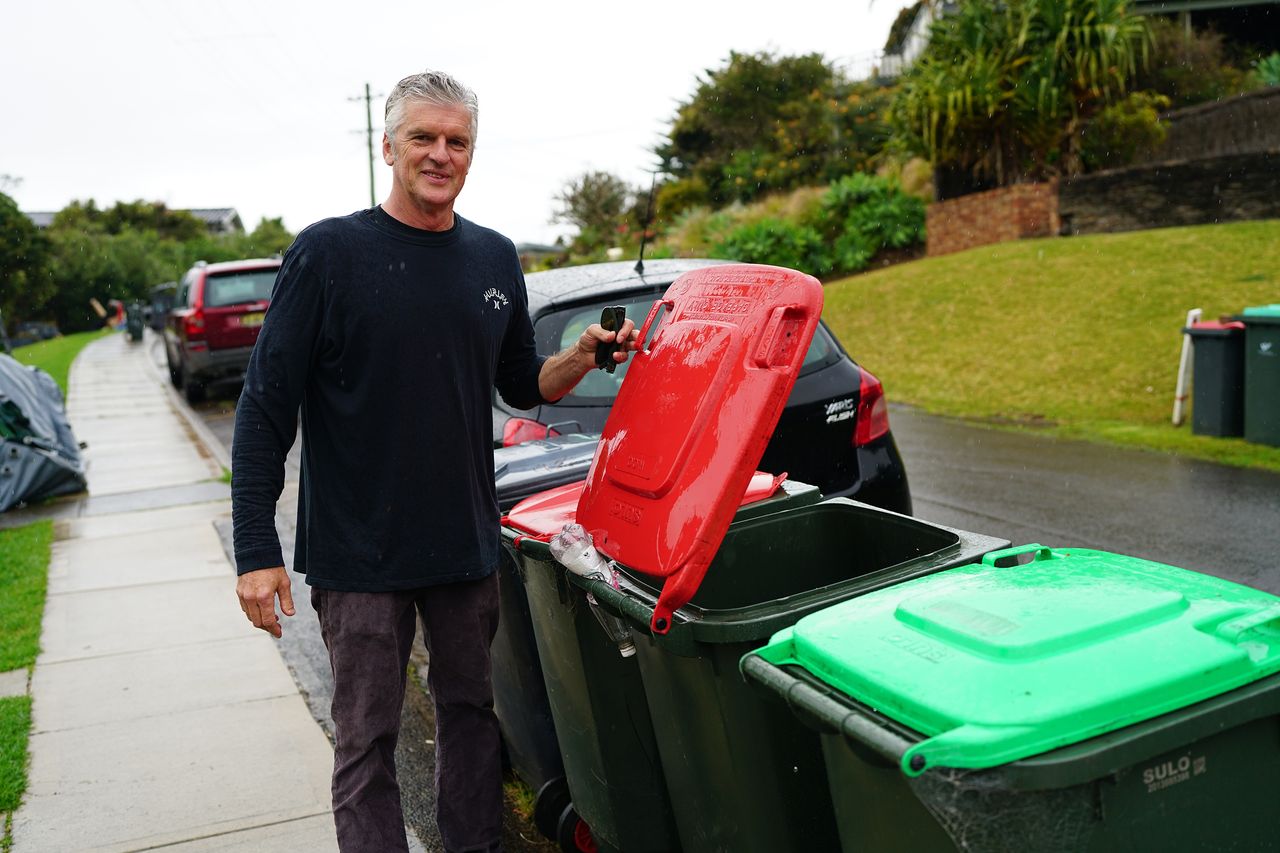Cockatoos Are Getting Smarter. Should Humans Be Worried?
Scientists in Australia say some birds have figured out how to defeat efforts to keep them out of garbage bins, and now they appear to be teaching the others
STANWELL PARK, Australia—Outside a local cafe, a sulphur-crested cockatoo perched on a garbage bin, trying to open the lid. Another loitered nearby, waiting to see if its companion found tasty morsels in the trash.
The birds, a type of parrot that is native to Australia, were acting out a common scene in this beachside suburb. There was a lock on the bin, but it seemed either broken or not properly closed. Coffee cups littered the street.
“It is chaos every Tuesday morning,” said Grant Drinkwater, 61, who has experimented with various devices to stop cockatoos from getting into his bins, which are collected that day each week. “Some people put bricks on top of their bins, but the cockatoos just push them off with their nose.”
This otherwise idyllic coastal neighbourhood is Ground Zero for what scientists call a potential “innovation arms race” between humans and cockatoos battling for control of the area’s garbage bins. As the cockatoos figure out ways into people’s bins, the humans respond with evermore elaborate devices to protect their garbage.
Trashy encounters between man and beast aren’t uncommon, as any suburban resident who has tried to keep raccoons out of the rubbish can attest. But in Australia, the age-old tension has reached wild heights.
The unusual bird bin-opening, a behaviour which scientists believe developed only in recent years, is now the subject of rigorous academic study. Researchers say it’s a unique opportunity to investigate how two species can learn—that is, cockatoos teaching others how to get into bins or people swapping bin-protection methods with their neighbours—to quickly adapt to what the other is doing.
Many days, the cockatoos seem to be winning.
Mr. Drinkwater thought he had a solution: He attached a piece of wood to the underside of his bin lid, which he figured would make it too heavy for the cockatoos to lift. It worked until the lid snapped off during trash collection one week, when a garbage truck used a robotic arm to grab the bin and turn it upside down.
He then switched to using a brick, but the cockatoos knocked it out of the way, got into the bin and threw trash all over the street. Now, he wedges a plastic drink bottle in the hinge of the lid, which he says prevents the birds from fully flipping it open. But some of his neighbours still have their guard down. On a recent trash day, an unprotected bin on his street was hit.
“It was a demolition derby,” said Mr. Drinkwater, recalling one particularly bad morning when cockatoos tossed garbage everywhere.
To open a bin, a cockatoo generally uses its beak and foot to lift the lid, shuffle along the side of it and then flip it over. Only a small percentage of cockatoos can flip the lid, but once it’s open, other birds dive in to search for food.
In a recent study, scientists found 52 different ways that people protected their bins from cockatoos. That ranged from weighting the bin lids to shoving old sneakers or a pool noodle in the hinge to fitting specially designed commercial latches onto the bins that residents call “cockie locks.”
In one case, someone tried to scare away the cockatoos with a rubber snake. Another person installed spikes to prevent the cockatoos from landing.
“I was just super excited about the variety,” said Barbara Klump, a behavioural ecologist at the Max Planck Institute of Animal Behavior, a scientific research institute in Germany, who led the research. “Originally I thought, ‘How many methods can there be to block the access to a bin?’ ”
The researchers grouped the bin-protection devices into multiple categories based on their sophistication, and confirmed the birds could defeat “low efficacy” methods like a rock on top of a bin. The study, published in the scientific journal “Current Biology,” included a picture of a cockatoo pushing away a brick.
Employing what they called a “spatial network approach,” the scientists found there were clusters of bins with similar protection methods. They also used data from an online survey to develop a mathematical model to show how human countermeasures changed over the years.
The cockatoos are good problem solvers, said Richard Major, a bird ecologist at the Australian Museum, a museum of natural history in Sydney. They generally eat a lot of grass seeds, roots and berries, but clearly aren’t picky. Dr. Major said he’s seen a cockatoo eating a chicken drumstick, and another gorging on what looked like a whole baked fish carcass.
“They’ve actually started to work in packs,” said Edith McNally, a retired school principal, who often sees cockatoos rummaging through bins on her morning walks in the neighbourhood. “It’s like gang warfare.”
Residents say the key is to prevent the birds from flipping the lid, which allows other birds to raid the bin. But the defences still have to allow the bin lid to open for the garbage truck. Ms. McNally, 73, tried wedging a broom handle into the lid’s hinge, but the handle sometimes fell into the garbage truck when the bin got tipped upside down.
Now she uses a cockie lock, which she says seems to be effective. One Australian company that makes the locks, Secure-A-Lid, says it uses a “gravity-release design mechanism” that disengages the main latch when the bin is tilted by garbage collectors.
Owner Brett Sweetnam was inspired to develop the device after his bins were raided by cockatoos, though it can protect against any creatures that might rummage through the garbage, he said.
Scientists say more research needs to be done. Dr. Klump and her colleagues are still running a survey to see if the bin-opening behaviour spreads to other areas.
Cate Bridgford, 22, who works at the cafe where the cockatoo was trying to open the bin, said that one time, the birds tossed soiled baby diapers from the garbage all over the ground.
“I don’t get mad at the birds. The birds, they just do what they do,” she said. “Those are our raccoons.”
 Copyright 2020, Dow Jones & Company, Inc. All Rights Reserved Worldwide. LEARN MORE
Copyright 2020, Dow Jones & Company, Inc. All Rights Reserved Worldwide. LEARN MORE
This stylish family home combines a classic palette and finishes with a flexible floorplan
Just 55 minutes from Sydney, make this your creative getaway located in the majestic Hawkesbury region.
As Paris makes its final preparations for the Olympic games, its residents are busy with their own—packing their suitcases, confirming their reservations, and getting out of town.
Worried about the hordes of crowds and overall chaos the Olympics could bring, Parisians are fleeing the city in droves and inundating resort cities around the country. Hotels and holiday rentals in some of France’s most popular vacation destinations—from the French Riviera in the south to the beaches of Normandy in the north—say they are expecting massive crowds this year in advance of the Olympics. The games will run from July 26-Aug. 1.
“It’s already a major holiday season for us, and beyond that, we have the Olympics,” says Stéphane Personeni, general manager of the Lily of the Valley hotel in Saint Tropez. “People began booking early this year.”
Personeni’s hotel typically has no issues filling its rooms each summer—by May of each year, the luxury hotel typically finds itself completely booked out for the months of July and August. But this year, the 53-room hotel began filling up for summer reservations in February.
“We told our regular guests that everything—hotels, apartments, villas—are going to be hard to find this summer,” Personeni says. His neighbours around Saint Tropez say they’re similarly booked up.
As of March, the online marketplace Gens de Confiance (“Trusted People”), saw a 50% increase in reservations from Parisians seeking vacation rentals outside the capital during the Olympics.
Already, August is a popular vacation time for the French. With a minimum of five weeks of vacation mandated by law, many decide to take the entire month off, renting out villas in beachside destinations for longer periods.
But beyond the typical August travel, the Olympics are having a real impact, says Bertille Marchal, a spokesperson for Gens de Confiance.
“We’ve seen nearly three times more reservations for the dates of the Olympics than the following two weeks,” Marchal says. “The increase is definitely linked to the Olympic Games.”

Getty Images
According to the site, the most sought-out vacation destinations are Morbihan and Loire-Atlantique, a seaside region in the northwest; le Var, a coastal area within the southeast of France along the Côte d’Azur; and the island of Corsica in the Mediterranean.
Meanwhile, the Olympics haven’t necessarily been a boon to foreign tourism in the country. Many tourists who might have otherwise come to France are avoiding it this year in favour of other European capitals. In Paris, demand for stays at high-end hotels has collapsed, with bookings down 50% in July compared to last year, according to UMIH Prestige, which represents hotels charging at least €800 ($865) a night for rooms.
Earlier this year, high-end restaurants and concierges said the Olympics might even be an opportunity to score a hard-get-seat at the city’s fine dining.
In the Occitanie region in southwest France, the overall number of reservations this summer hasn’t changed much from last year, says Vincent Gare, president of the regional tourism committee there.
“But looking further at the numbers, we do see an increase in the clientele coming from the Paris region,” Gare told Le Figaro, noting that the increase in reservations has fallen directly on the dates of the Olympic games.
Michel Barré, a retiree living in Paris’s Le Marais neighbourhood, is one of those opting for the beach rather than the opening ceremony. In January, he booked a stay in Normandy for two weeks.
“Even though it’s a major European capital, Paris is still a small city—it’s a massive effort to host all of these events,” Barré says. “The Olympics are going to be a mess.”
More than anything, he just wants some calm after an event-filled summer in Paris, which just before the Olympics experienced the drama of a snap election called by Macron.
“It’s been a hectic summer here,” he says.

AFP via Getty Images
Parisians—Barré included—feel that the city, by over-catering to its tourists, is driving out many residents.
Parts of the Seine—usually one of the most popular summertime hangout spots —have been closed off for weeks as the city installs bleachers and Olympics signage. In certain neighbourhoods, residents will need to scan a QR code with police to access their own apartments. And from the Olympics to Sept. 8, Paris is nearly doubling the price of transit tickets from €2.15 to €4 per ride.
The city’s clear willingness to capitalise on its tourists has motivated some residents to do the same. In March, the number of active Airbnb listings in Paris reached an all-time high as hosts rushed to list their apartments. Listings grew 40% from the same time last year, according to the company.
With their regular clients taking off, Parisian restaurants and merchants are complaining that business is down.
“Are there any Parisians left in Paris?” Alaine Fontaine, president of the restaurant industry association, told the radio station Franceinfo on Sunday. “For the last three weeks, there haven’t been any here.”
Still, for all the talk of those leaving, there are plenty who have decided to stick around.
Jay Swanson, an American expat and YouTuber, can’t imagine leaving during the Olympics—he secured his tickets to see ping pong and volleyball last year. He’s also less concerned about the crowds and road closures than others, having just put together a series of videos explaining how to navigate Paris during the games.
“It’s been 100 years since the Games came to Paris; when else will we get a chance to host the world like this?” Swanson says. “So many Parisians are leaving and tourism is down, so not only will it be quiet but the only people left will be here for a party.”
This stylish family home combines a classic palette and finishes with a flexible floorplan
Just 55 minutes from Sydney, make this your creative getaway located in the majestic Hawkesbury region.






















